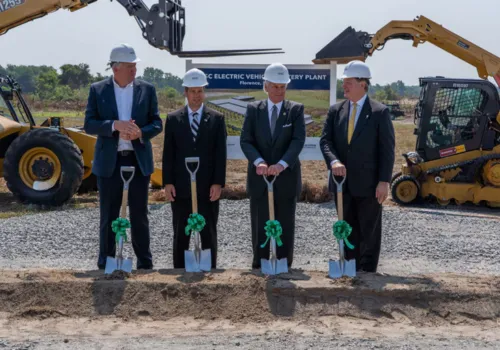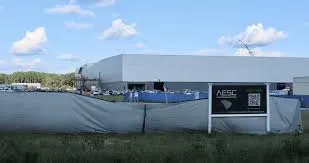
Japanese electric vehicle battery manufacturer Envision AESC has paused construction on its large-scale manufacturing facility in Florence County, South Carolina, raising questions about the timeline for its promised investment and job creation. The decision comes amid policy uncertainty in Washington and shifting market dynamics in the electric vehicle (EV) sector.
The $1.6 billion project, which broke ground in 2022, was set to bring 1,600 new jobs to the region and quickly became one of the Pee Dee’s most significant economic development undertakings. But on Thursday, AESC confirmed it is halting construction, two years after site work began.
“AESC has informed the state of South Carolina and our local partners that due to policy and market uncertainty, we are pausing construction at our South Carolina facility at this time,” spokesman Brad Grantham said in a statement. “We anticipate being able to resume construction once circumstances stabilize.”
Grantham emphasized the company has already invested more than $1 billion into the Florence facility and reiterated its commitment to the long-term vision.
He said the company “fully intends to meet our commitments to invest $1.6 billion and create 1,600 jobs in the coming years,” but did not indicate what the new timeline might be.
The company declined further comment.
South Carolina Governor Henry McMaster addressed the news while speaking to reporters, framing the pause as a temporary consequence of federal policy uncertainty.
“We hate to see that happen, but a pause is OK,” he said, pointing to a recent temporary suspension at Volvo’s Lowcountry plant.
McMaster, a vocal supporter of former President Donald Trump, highlighted trade policy turbulence and proposed federal legislation as contributing factors to delays and hesitancy among international investors.
“There’s no doubt that changes must be made to international trade policy,” McMaster said. “The tariffs are going up and down, and some of those are being paused.”
A bill passed by the U.S. House of Representatives would eliminate key EV tax credits — for purchases of electric vehicles and for EV charger installations. Its future in the Senate remains unclear, but the move has already created waves across the industry.

“Let things play out, because all of these changes are taking place,” the governor added. “So, I’d say, relax if you can. … We believe that, give it some time, and it’ll work out.”
While electric vehicle sales are still rising globally, the pace of growth has not met early projections, and multiple high-profile EV investments have been canceled or delayed, including in South Carolina. Several automakers have also shifted from all-electric strategies to offering hybrid options as a hedge.
AESC’s announcement follows a February decision to pull out of a planned second building that would have produced batteries for a BMW plant in Mexico, costing the state 1,080 new jobs and prompting the state to rescind $111 million in previously approved incentives.
Nevertheless, AESC’s remaining factory in Florence remains a major win for the region. It’s tied to BMW’s $700 million battery assembly facility in Woodruff, where production is still expected to begin in 2026.
BMW spokesman Steve Wilson confirmed that “those battery assembly plans are still on schedule to begin in 2026.”
From the project’s initial 2022 announcement through early 2024, AESC had made three separate rounds of job and investment commitments in South Carolina. Even after the second-building cancellation, the Florence facility was still on track to become the largest industrial investment in the Pee Dee region’s history.
South Carolina’s Department of Commerce has affirmed its continued support.
“South Carolina is fully and unequivocally committed to supporting existing companies, including AESC,” Commerce spokeswoman Alex Clark said.
Clark added that the $121 million in bonds and $135 million in grants tied to the initial phase remain intact despite the construction pause.
Originally reported by Jessica Holdman in South Carolina Daily Gazette.